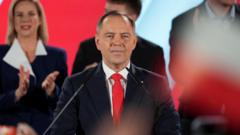In a dramatic electoral twist, historian Karol Nawrocki has emerged as Poland's new president, narrowly beating Warsaw's liberal mayor Rafal Trzaskowski in a fiercely contested race that has significant implications for the country's future political direction.
Karol Nawrocki Declared President of Poland After Tight Race

Karol Nawrocki Declared President of Poland After Tight Race
Right-wing candidate Karol Nawrocki edges out rival Rafal Trzaskowski in a nail-biting election.
The state electoral commission reported that Nawrocki secured 50.9% of the votes, while Trzaskowski garnered 49.1%. The early exit polls had indicated a lead for Trzaskowski, who prematurely declared victory only to be met with dismay when the final tally swung the other way. "We won, although the phrase 'razor's edge' will forever enter Polish politics," Trzaskowski commented, conveying the intense emotions of the night.
Nawrocki, who remains aligned with Poland's national conservative Law and Justice (PiS) party, is expected to leverage the presidential veto to impede Prime Minister Donald Tusk's pro-EU initiatives. His presidency heralds a resurgence of support for PiS, previously ousted from power, as Nawrocki aims to solidify traditional Catholic values and emphasize Polish sovereignty within the EU.
Although the presidency in Poland is primarily ceremonial, it does provide the authority to veto legislation, a power that could figure prominently in the coming months as Tusk's administration attempts to advance policies aimed at judiciary reform and social issues. The outgoing president, Andrzej Duda, congratulated Nawrocki on a hard-fought campaign, which he described as 'incredibly courageous'.
Nawrocki's positions are notably less favorable towards the EU's climate and migration policies and have raised some eyebrows due to potential contradictions regarding personal property during the campaign. Nonetheless, his energetic persona and focus on ordinary citizens resonate with many voters, leading them to rally behind his vision for Poland's future on the world stage.
As Poland stands at a pivotal moment in its political landscape, all eyes will be on Nawrocki's decisions and their implications for both domestic affairs and the nation’s role within the European Union.
Nawrocki, who remains aligned with Poland's national conservative Law and Justice (PiS) party, is expected to leverage the presidential veto to impede Prime Minister Donald Tusk's pro-EU initiatives. His presidency heralds a resurgence of support for PiS, previously ousted from power, as Nawrocki aims to solidify traditional Catholic values and emphasize Polish sovereignty within the EU.
Although the presidency in Poland is primarily ceremonial, it does provide the authority to veto legislation, a power that could figure prominently in the coming months as Tusk's administration attempts to advance policies aimed at judiciary reform and social issues. The outgoing president, Andrzej Duda, congratulated Nawrocki on a hard-fought campaign, which he described as 'incredibly courageous'.
Nawrocki's positions are notably less favorable towards the EU's climate and migration policies and have raised some eyebrows due to potential contradictions regarding personal property during the campaign. Nonetheless, his energetic persona and focus on ordinary citizens resonate with many voters, leading them to rally behind his vision for Poland's future on the world stage.
As Poland stands at a pivotal moment in its political landscape, all eyes will be on Nawrocki's decisions and their implications for both domestic affairs and the nation’s role within the European Union.

















